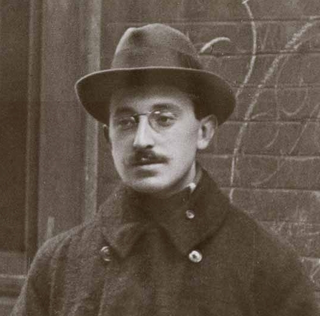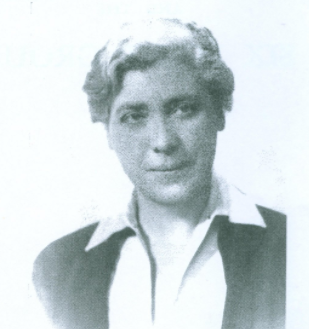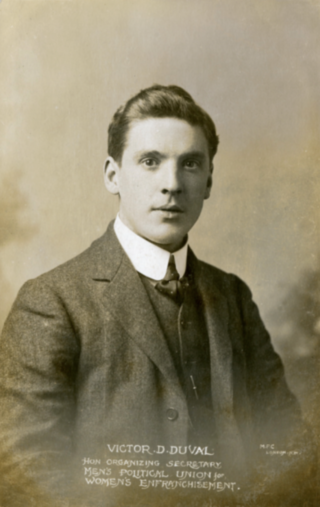
Emily Wilding Davison was an English suffragette who fought for votes for women in Britain in the early twentieth century. A member of the Women's Social and Political Union (WSPU) and a militant fighter for her cause, she was arrested on nine occasions, went on hunger strike seven times and was force-fed on forty-nine occasions. She died after being hit by King George V's horse Anmer at the 1913 Derby when she walked onto the track during the race.

The Women's Social and Political Union (WSPU) was a women-only political movement and leading militant organisation campaigning for women's suffrage in the United Kingdom from 1903 to 1918. Known from 1906 as the suffragettes, its membership and policies were tightly controlled by Emmeline Pankhurst and her daughters Christabel and Sylvia; Sylvia was eventually expelled.

The United Procession of Women, or Mud March as it became known, was a peaceful demonstration in London on 9 February 1907 organised by the National Union of Women's Suffrage Societies (NUWSS) in which more than 3,000 women marched from Hyde Park Corner to the Strand in support of women's suffrage. Women from all classes participated in what was the largest public demonstration supporting women's suffrage seen until then. It acquired the name "Mud March" from the day's weather since incessant heavy rain left the marchers drenched and mud-spattered.

Black Friday was a suffragette demonstration in London on 18 November 1910, in which 300 women marched to the Houses of Parliament as part of their campaign to secure voting rights for women. The day earned its name from the violence meted out to protesters, some of it sexual, by the Metropolitan Police and male bystanders.

A movement to fight for women's right to vote in the United Kingdom finally succeeded through acts of Parliament in 1918 and 1928. It became a national movement in the Victorian era. Women were not explicitly banned from voting in Great Britain until the Reform Act 1832 and the Municipal Corporations Act 1835. In 1872 the fight for women's suffrage became a national movement with the formation of the National Society for Women's Suffrage and later the more influential National Union of Women's Suffrage Societies (NUWSS). As well as in England, women's suffrage movements in Wales, Scotland and other parts of the United Kingdom gained momentum. The movements shifted sentiments in favour of woman suffrage by 1906. It was at this point that the militant campaign began with the formation of the Women's Social and Political Union (WSPU).

Elsie Edith Bowerman was a British lawyer, suffragette, political activist, and RMS Titanic survivor.

A suffragette was a member of an activist women's organisation in the early 20th century who, under the banner "Votes for Women", fought for the right to vote in public elections in the United Kingdom. The term refers in particular to members of the British Women's Social and Political Union (WSPU), a women-only movement founded in 1903 by Emmeline Pankhurst, which engaged in direct action and civil disobedience. In 1906, a reporter writing in the Daily Mail coined the term suffragette for the WSPU, derived from suffragist, in order to belittle the women advocating women's suffrage. The militants embraced the new name, even adopting it for use as the title of the newspaper published by the WSPU.

Hugh Arthur Franklin was a British suffragist and politician. Born into a wealthy Anglo-Jewish family, he rejected both his religious and social upbringing to protest for women's suffrage. Joining in with the militant suffragettes, he was sent to prison multiple times, making him one of the few men to be imprisoned for his part in the suffrage movement. His crimes included an attempted attack on Winston Churchill and an act of arson on a train. He was the first person to be released under the Prisoners Act 1913, and he later married the second, Elsie Duval. Following his release, he never returned to prison, but still campaigned for women's rights and penal reform. He stood unsuccessfully for parliament on two occasions, but did win a seat on Middlesex County Council and was a member of the Labour Party executive committee.

Helen Miller Fraser, later Moyes, was a Scottish suffragist, feminist, educationalist and Liberal Party politician who later emigrated to Australia.

Women's suffrage in Wales has historically been marginalised due to the prominence of societies and political groups in England which led the reform for women throughout the United Kingdom. Due to differing social structures and a heavily industrialised working-class society, the growth of a national movement in Wales grew but then stuttered in the late nineteenth century in comparison with that of England. Nevertheless, distinct Welsh groups and individuals rose to prominence and were vocal in the rise of suffrage in Wales and the rest of Great Britain.

Dorothy Elizabeth Evans was a British feminist activist and suffragette. On the eve of World War I she was a militant organiser for the Women's Social and Political Union twice arrested in Belfast on explosives charges. She broke with Christabel Pankhurst and the WSPU in 1914 over their support for the war, and remained until the end of her life an active peace and women's equality campaigner.

Daisy Dorothea Solomon was posted as a human letter in the British suffragette campaign using a quirk in the postal system to approach the Prime Minister who would not receive a delegation of women demanding the right to vote. Solomon was secretary to suffragette groups and imprisoned for protest, and went on hunger strike.

Laura Frances Ainsworth was a British teacher and suffragette. She was employed by the Women's Social and Political Union and was one of the first suffragettes to be force-fed. She left the WSPU in 1912 in protest at the ejection of the Pethick-Lawrences, but continued to work for women's suffrage.
Jessie Cunningham Methven was a Scottish campaigner for women's suffrage. She was honorary secretary of the Edinburgh National Society for Women's Suffrage from the mid 1890s until 1906. She subsequently joined the more militant Women's Social and Political Union and described herself as an "independent socialist".

Edith Hudson was a British nurse and suffragette. She was an active member of the Edinburgh branch of the Women's Social and Political Union (WSPU) and was arrested several times for her part in their protests in Scotland and London. She engaged in hunger strikes while in prison and was forcibly fed. She was released after the last of these strikes under the so-called Cat and Mouse Act. Hudson was awarded a Hunger Strike Medal 'for Valour' by the WSPU.

Elsie Diederichs Duval (1892–1919) was a British suffragette. She was arrested many times throughout her life and in 1913 became the first woman to be released from Holloway Prison under the so-called 'Cat and Mouse Act'.

Louise Mary Eates was a British suffragette, chair of Kensington Women's Social and Political Union and a women's education activist.
Alice Morrissey was a British Catholic, socialist leader and suffragette activist from Liverpool, who was imprisoned in the campaign for women's right to vote.

Janie Terrero was a militant suffragette who, as a member of the Women's Social and Political Union (WSPU), was imprisoned and force-fed for which she received the WSPU's Hunger Strike Medal.

Victor Diederichs Duval was a British suffragist. He founded the Men's Political Union for Women's Enfranchisement (MPU) in 1910.



















